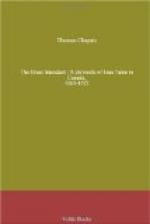Talon had to give in. But he did so in such a way as to gain his point in part. He wrote that he would speak no more of the great establishment he had thought possible, since the minister was of opinion that France had no excess of population which could be used for the peopling of Canada. At the same time he insisted on the necessity of helping the colony, and assured Colbert that, could he himself see Canada, he would be disposed to do his utmost for it, knowing that a new country cannot make its own way without being helped effectively at the outset. Talon’s tact and firmness of purpose had their reward, for the next year Colbert gave ample proof that he understood Canada’s situation and requirements.
On the question of the West India Company also there was some divergence of view between the minister and the intendant. As we have seen in a preceding chapter, Talon had expressed his apprehension of the evils likely to spring from the wide privileges exercised by the company. But this trading association was Colbert’s creation. He had contended that the failure of the One Hundred Associates was due to inherent weakness. The new one was stronger and could do better. Perhaps difficulties might arise in the beginning on account of the inexperience and greed of some of the company’s agents, but with time the situation would improve. It was not surprising that Colbert should defend the company he had organized. Nevertheless, on that point as on the other, Colbert contrived to meet Talon half-way. The Indian trade, he said, would be opened to the colonists, and for one year the company would grant freedom of trade generally to all the people of New France.
In connection with the rights of this company another question, affecting the finances, was soon to arise. By its charter the company was entitled to collect the revenues of the colony; that is to say, the taxes levied on the sale of beaver and moose skins. The tax on beaver skins was twenty-five per cent, called le droit du quart; the tax on moose skins was two sous per pound, le droit du dixieme. There was also the revenue obtained from the sale or farming out of the trading privileges at Tadoussac, la traite de Tadoussac. All these formed what was called le fonds du pays, the public fund, out of which were paid the emoluments of the governor and the public officers, the costs of the garrisons at Quebec, Montreal, and Three Rivers, the grants to religious communities, and other permanent yearly disbursements. The company had the right to collect the taxes, but was obliged to pay the public charges.




